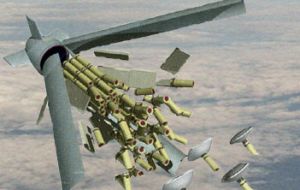MercoPress. South Atlantic News Agency
More than 100 countries sign treaty banning cluster bombs

Representatives of more than 100 countries gathered in Oslo, Norway Wednesday to sign a treaty banning cluster bombs. Norway, which has led efforts to ban cluster bombs, was the first to sign the Convention on Cluster Munitions, which bans the use, production, and sale of the weapons.
Next was Laos and Lebanon, both of which have experienced the lingering lethal effects of the munitions. The United States, China, India, Israel, Pakistan and Russia are among countries refusing to sign the cluster bomb ban. The US State Department Tuesday said outlawing the bombs would put the lives of US troops and their coalition partners at risk. Cluster bombs contain hundreds of smaller explosives that detonate over a wide area. Some of the explosives can fail to explode on impact and act as landmines, menacing civilian populations long after a conflict is over. US officials say the weapons are still useful, but that the Pentagon plans to phase out using current cluster bomb technology by 2018. The State Department says it is concerned about the dangers unexploded bombs pose to civilians and says Washington has spent more than one billion dollars cleaning them up. The group Human Rights Watch Tuesday appealed to President-elect Barack Obama to reverse Bush administration policy and make joining the cluster ban treaty a top priority. Thirty countries must ratify the treaty for it to take effect. Brazil is the only South American country which anticipated it would not sign the convention banning cluster bombs, "but will consider the issue in the future, for humanitarian reasons", said Foreign Secretary Celso Amorim. During a press conference in the Brazilian congress Amorim said "Brazil will not be an original signatory" because some points of the convention "don't convince us". Amorim mentioned the fact that the agreement was not negotiated in the framework of the United Nations and that the main promoters of the convention (France, Germany and United Kingdom) manufacture more sophisticated and lethal artefacts "than what we have" and "according to how the wording was drafted, does not include them". However since the nature of this explosive, similar in inhumanity conditions to antipersonnel mines, "Brazil is reconsidering its position" and could finally sign he admitted. "Maybe we could add a clause which gives countries with those bombs additional time to adapt to the conditions established", suggested Amorim.




Top Comments
Disclaimer & comment rulesCommenting for this story is now closed.
If you have a Facebook account, become a fan and comment on our Facebook Page!